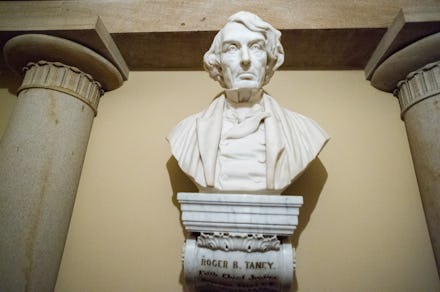Democrats are once again pushing to remove Confederate monuments from the Capitol

Finding Confederate monuments in the United States hardly takes a keen eye. You can see them proudly erected on public streets, in parks, and so many other locations that you may walk by them without question. No matter how unfortunately accustomed to these monuments you are, however, their existence in the U.S. Capitol seems to give anybody pause. Now, Democratic lawmakers are trying — again — to remove Confederate statues from Capitol Hill.
On Tuesday, House Democrats resurrected a bill to take down Confederate monuments at the Capitol that had passed last year. Although directed at removing all Confederate statues, a big focus of the bill is a bust of Roger B. Taney, which would be replaced with one of Thurgood Marshall, the first Black Supreme Court Justice.
If you don't know, Taney was the fifth chief justice of the Supreme Court and wrote the 1857 Dred Scott decision that said Black people could never become U.S. citizens — so they were entitled to none of the protections or legal rights granted to citizens. Of course, that's now widely regarded as one of the worst Supreme Court decisions of all time.
"Painful symbols of racism and white supremacy have no place in our society and certainly should not be enshrined in the U.S. Capitol," Rep. Barbara Lee (D-Calif.), who supported the measure, said in a statement. "It is past time for Congress to stop glorifying those who committed treason against the United States in a concerted effort to uphold slavery and systemic racism."
Last year, the Republican-controlled Senate ended up stalling the measure. Now, Democrats have control of both the House and Senate. Although their majority in the Senate isn't by much, they only need 60 votes — so 10 Republican votes — to advance the bill further. Notably, 67 Republicans joined all Democrats in the House vote
"I often say that the Halls of Congress is America's classroom. We ought to teach honor, in this hall, that which makes our country great — not celebrate those who were proponents of racial inequality and hatred," House Majority Whip James Clyburn (D-S.C.) wrote. "It is long past time we #RemoveHate from the U.S. Capitol."
If the bill is passed, not only would Taney's bust come down, but so would all of the statues of people who served in the Confederacy. Per NBC News, Jefferson Davis, the Confederate president, is displayed in Statuary Hall. You're also looking at the removal of statues of Vice President John C. Calhoun, North Carolina Gov. Charles Brantley Aycock, and Arkansas Sen. James Paul Clarke, who were all for slavery, segregation, and white supremacy overall.
There are a ton of monuments throughout the Capitol, so its architect will be asked to help identify any other statues that should be removed. All those removed monuments won't be destroyed, unfortunately. Instead, they'll be returned to the states that sent them there in the first place. In theory, those states could decide to erect the statues elsewhere. But the push to remove Confederate statues really didn't start with Democratic lawmakers, but regular people.
So if states go ahead and re-erect those monuments elsewhere, people may decide to do something about it. And let's be real, regular people have to jump through a lot fewer hoops than politicians. It's technically illegal to just remove statues, sure, but when has that ever stopped anybody? Just ask the Christopher Columbus statue that Baltimore protesters tore down last year, or the one in Richmond that was set on fire and then thrown into a lake for good measure.
While Democrats control the Senate now, they're likely to still face resistance from Republican politicians. However, Republicans might have a harder time arguing their case now that Democratic lawmakers can point to the Jan. 6 attack when supporters of former President Donald Trump stormed Capitol Hill as evidence that the bill needs to be passed now.
“On Jan. 6, we experienced the divisiveness of Confederate battle flags being flown inside the U.S. Capitol," Clyburn said in a statement. "Yet there are still vestiges that remain in this sacred building that glorify people and a movement that embraced that flag and sought to divide and destroy our great country."
Clyburn continued, "This legislation will remove these commemorations from places of honor and demonstrate that as Americans we do not celebrate those who seek to divide us."